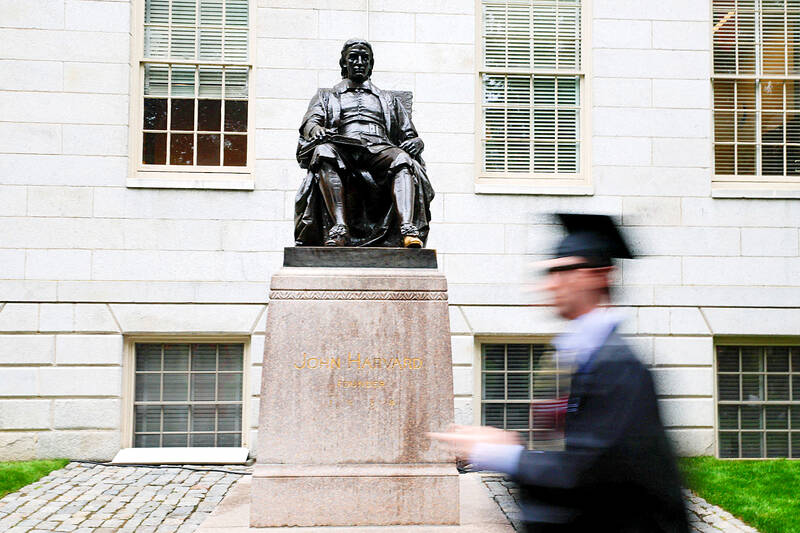US President Donald Trump told reporters on Friday that he wanted to assure Chinese international students in the country that they would be fine amid his administration’s crackdown on academia.
Trump’s administration this week said it would specifically target permissions for Chinese students in its latest broadside against US higher education.
However, asked what message he would send to Chinese college students in the country, Trump insisted: “They’re going to be ok. It’s going to work out fine.”

Photo: Reuters
The softer tone comes after a judge on Thursday extended a temporary block on Trump’s bid to prevent Harvard from enrolling international students.
US Secretary of State Marco Rubio vowed on Wednesday to “aggressively” revoke visas to students from China.
Rubio has already yanked thousands of visas, largely over students’ involvement in activism critical of Israel’s offensive in Gaza, but also over minor traffic contraventions and other infractions.
The Trump administration has been in an ongoing showdown with academia, Harvard in particular, demanding it provide a list of students that the government is interested in, something the university has declined to do.
“I don’t know why Harvard’s not giving us the list. There’s something going on, because Harvard is not giving us a list,” Trump said.
“They don’t want to give the list, because they have names on there that supposedly are quite bad,” he said.
At graduation ceremonies this week, Harvard University president Alan Garber received a standing ovation when he called for universities to stand “firm” in the war the Trump administration has waged against students and schools.

DEFENSE: The first set of three NASAMS that were previously purchased is expected to be delivered by the end of this year and deployed near the capital, sources said Taiwan plans to procure 28 more sets of M-142 High Mobility Artillery Rocket Systems (HIMARS), as well as nine additional sets of National Advanced Surface-to-Air Missile Systems (NASAMS), military sources said yesterday. Taiwan had previously purchased 29 HIMARS launchers from the US and received the first 11 last year. Once the planned purchases are completed and delivered, Taiwan would have 57 sets of HIMARS. The army has also increased the number of MGM-140 Army Tactical Missile Systems (ATACMS) purchased from 64 to 84, the sources added. Each HIMARS launch pod can carry six Guided Multiple Launch Rocket Systems, capable of

Authorities have detained three former Taiwan Semiconductor Manufacturing Co (TMSC, 台積電) employees on suspicion of compromising classified technology used in making 2-nanometer chips, the Taiwan High Prosecutors’ Office said yesterday. Prosecutors are holding a former TSMC engineer surnamed Chen (陳) and two recently sacked TSMC engineers, including one person surnamed Wu (吳) in detention with restricted communication, following an investigation launched on July 25, a statement said. The announcement came a day after Nikkei Asia reported on the technology theft in an exclusive story, saying TSMC had fired two workers for contravening data rules on advanced chipmaking technology. Two-nanometer wafers are the most

TRAJECTORY: The severe tropical storm is predicted to be closest to Taiwan on Wednesday and Thursday, and would influence the nation to varying degrees, a forecaster said The Central Weather Administration (CWA) yesterday said it would likely issue a sea warning for Tropical Storm Podul tomorrow morning and a land warning that evening at the earliest. CWA forecaster Lin Ting-yi (林定宜) said the severe tropical storm is predicted to be closest to Taiwan on Wednesday and Thursday. As of 2pm yesterday, the storm was moving west at 21kph and packing sustained winds of 108kph and gusts of up to 136.8kph, the CWA said. Lin said that the tropical storm was about 1,710km east of Oluanpi (鵝鑾鼻), Taiwan’s southernmost tip, with two possible trajectories over the next one

CHINA’s BULLYING: The former British prime minister said that he believes ‘Taiwan can and will’ protect its freedom and democracy, as its people are lovers of liberty Former British prime minister Boris Johnson yesterday said Western nations should have the courage to stand with and deepen their economic partnerships with Taiwan in the face of China’s intensified pressure. He made the remarks at the ninth Ketagalan Forum: 2025 Indo-Pacific Security Dialogue hosted by the Ministry of Foreign Affairs and the Prospect Foundation in Taipei. Johnson, who is visiting Taiwan for the first time, said he had seen Taiwan’s coastline on a screen on his indoor bicycle, but wanted to learn more about the nation, including its artificial intelligence (AI) development, the key technology of the 21st century. Calling himself an